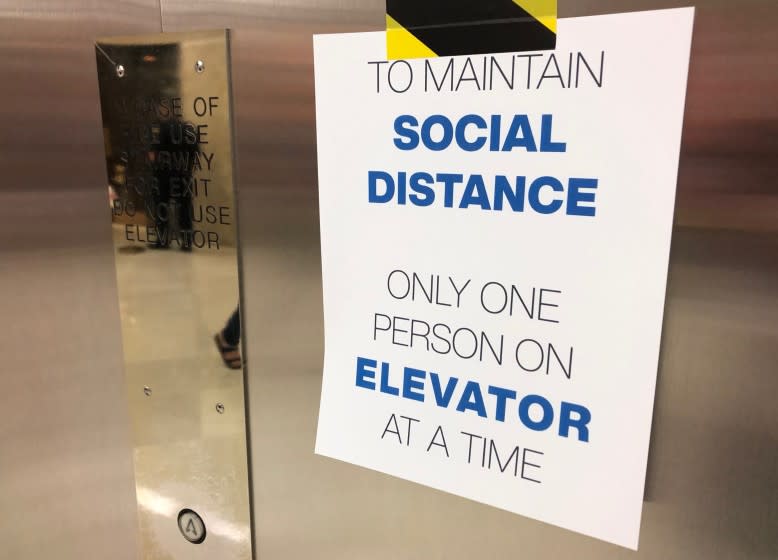Strict rules, limited access as California Legislature resumes work on coronavirus needs

Separated from one another and wearing masks while speaking into microphones draped with protective coverings, some members of the California Legislature returned to the state Capitol on Monday, determined to begin addressing the myriad problems caused by the coronavirus pandemic.
Seven weeks after public health concerns brought the work of the Legislature to a sudden halt, only members of the Assembly are returning to Sacramento this week, with the Senate choosing to do so on May 11. And even then, neither house is planning to reconvene for final votes on bills until June — in large part because of the challenges for adequate physical distancing posed by the tightly placed desks for legislators in the chambers of the Senate and Assembly.
"I know it’s going to be a very different way of doing business. But I think it was important for us to be here, to start thinking about the great challenges that we have ahead," Assemblywoman Blanca Rubio (D-Baldwin Park) said during the day's first event, an Assembly hearing on healthcare issues.
Access to the historic statehouse remained limited. Those who were not legislators or staff members had their temperatures checked at the building's entrance. Elevators were limited to a single occupant — an easy rule to follow on Monday, given the Capitol's emptiness, but impossible during most springtime workdays, when dozens of hearings and events are usually scheduled.
"The work of the Legislature is essential for democracy, but preserving people's health as we do that is of the highest importance,” Assembly Speaker Anthony Rendon (D-Lakewood) said in a statement. “We have spent the past six weeks developing a way to continue government with maximum safety."
Assembly members were advised by Dr. Peter Beilenson, director of Sacramento's County Department of Health Services, to be screened for the novel coronavirus before returning Monday.
“To protect both the legislators when they gather and the public who will be attending, I recommended that they get tested,” he said in an interview.
Because asymptomatic people can still transmit the virus, Beilenson said, all lawmakers and staff should contact their private physicians to arrange coronavirus tests, even if they are not showing symptoms.
“Anyone testing positive should isolate themselves at home for 14 days,” Beilenson wrote in a memo to the Assembly. “Of course, any legislator or staff that falls in the high-risk groups (65-plus and/or chronic underlying health conditions) should follow the guidance of their healthcare provider in terms of their decision about whether or not they should attend the session.”
Some lawmakers, including Assemblywoman Lorena Gonzalez (D-San Diego), have balked at getting a test when many other members of the public, including healthcare workers, have not yet been checked for the virus. Gonzalez said she asked for a clear directive from Beilenson’s office that she could give to her doctor, but she has not received one.
“As such, I do not meet our county’s criteria for testing and will not ask to be pushed to the front of the line,” Gonzalez said. “If I am required to get tested in Sacramento, exhibit any symptoms or am exposed to a COVID-19-positive individual, I will do so.”
Age is one risk factor among the 120 members of the Legislature. Thirteen members of the Senate are 65 or older, while 10 in that age group serve in the Assembly.
California had more than 55,000 confirmed cases and more than 2,200 deaths tied to the virus as of Monday afternoon, according to data collected by The Times. A spokesman for Rendon said his office has not heard of any Assembly member testing positive for COVID-19.
Six Assembly members asked for, and were granted, an excused absence from traveling to Sacramento due to age or underlying health conditions. One of them, Assemblyman Bill Quirk (D-Hayward), sent a letter to Rendon asking for consideration to vote remotely on bills.
“We see individuals, despite taking the best of precautions, getting infected,” Quirk said on Friday. “This is concerning."
But legislative lawyers think a 2016 constitutional amendment, approved by voters, makes that untenable. Article IV, Section 7 of the California Constitution says that “the proceedings of each house and the committees thereof shall be open and public,” written as part of Proposition 54's mandate that bills be available for public review for 72 hours before a final vote. The concern is that lawmakers voting remotely won’t meet the standard for public access to their actions.
Assemblyman Kevin Mullin (D-San Mateo), who serves as speaker pro tem, says he’s working on a constitutional amendment to help clarify the rules in hopes that it provides governing options in times like these and during natural disasters. The change would have to be approved by voters this November.
How much the Legislature can accomplish this year is limited by the calendar. Almost all of the Assembly’s policy committees will meet only one more time this year to consider bills authored by its members. Only 14 bills were on the agenda for Monday's meeting of the Assembly Transportation Committee, even though legislative records show 84 bills were sent to the committee — meaning most of them will be held without further action.
The transportation panel offered one of the more unusual moments on Monday, its 15 members and assorted staff convening in the cavernous Assembly chamber, where they could safely spread out.
Two legislators wore gloves. One of them, Assemblyman Mike Gipson (D-Carson), sported a black protective mask with the phrase "California Safe" written in white letters.
"What a historic moment," said Assemblywoman Luz Rivas (D-North Hollywood) as she stood behind a stanchion to present her bill, Assembly Bill 3213, which seeks to force new project priorities for the California High-Speed Rail Authority. With no public witnesses in person or dialed in by phone, her bill was quickly approved and sent to the Assembly Appropriations Committee.

